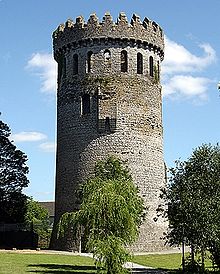Daniel Abbot
Daniel Abbot (or Abbott fl. 1650s) was a colonel of a regiment of dragoons in the New Model Army who fought throughout the Cromwellian conquest of Ireland and settled in the country once the war was over.
Biography

Daniel Abbot came to Ireland with Oliver Cromwell as colonel of a regiment of dragoons. He fought through the Cromwellian conquest of Ireland.[1]
When the bulk of the army was disbanded in May 1653 he was chosen, along with Colonel Sadleir, Major Morgan and Vincent Gookin as the Trustees to carry out the assigning confiscated lands to the army for arrears of pay. His own arrears were satisfied in the barony of Moyfenrath, but led to a legal dispute with Dr Henry Jones.[2]
After capturing Nenagh Castle in 1650, Abbot was appointed the military governor of it and appears to have made it his main dwelling from then until the Restoration.[3][4][5]
Abbot was the second member for the counties Tipperary and Waterford in Second Protectorate Parliament which sat from 17 September 1656 until 4 February 1658.[6] On 16 November 1658, Abbot was knighted at Dublin Castle by Henry Cromwell; Lord Deputy of Ireland.[7]
Abbot was suspected of being opposed to the Restoration and in 1663 he took part in Blood's Plot to upset the Government. A reward of £100 was offered for his apprehension, but he managed to escape.[1][8]
Family
Abbot married a daughter Thomas Sadleir (who was Lieutenant-General and Adjutant of the Irish Brigade in 1647).[9]
Notes
- ^ a b Dunlop 1913, p. 57.
- ^ Dunlop 1913, pp. clvii, 57.
- ^ Royal Society of Antiquaries of Ireland 1936, p. 257.
- ^ Royal Society of Antiquaries of Ireland 1937, p. 113.
- ^ Gleeson 1938, p. 85.
- ^ Willis 1750, p. 284.
- ^ Shaw 1906, p. 224.
- ^ Greaves 1990, p. 107.
- ^ Sadler 1809, pp. 614–615.
References
- Dunlop, Robert (1913), Ireland under the commonwealth : being a selection of documents relating to the government of Ireland from 1651 to 1659, Manchester University Press, p. 57
- Gleeson, Dermot F. (1938), The Last Lords of Ormond: A History of the "Countrie of the Three O'Kennedys" During the Seventeenth Century, Sheed & Ward, p. 85
- Greaves, Richard L. (1990), Enemies Under His Feet: Radicals and Nonconformists in Britain, 1664-1677, Stanford University Press, p. 107, ISBN 9780804717755
- Royal Society of Antiquaries of Ireland (1936), "The castle and manor of Nenach", The Journal of the Royal Society of Antiquaries of Ireland, 66, The Society: 257
- Royal Society of Antiquaries of Ireland (1937), "The Silver Mines of Ormond", The Journal of the Royal Society of Antiquaries of Ireland, 67, The Society: 113
- Sadler, Ralph (1809), Iche State papers and letters,2: edited by Orslus Clifford ..., Oirchibald Cousrable and Co, pp. 614–615
{{citation}}: CS1 maint: extra punctuation (link) - Shaw, William Arthur (1906), The Knights of England: A complete record from the earliest time to the present day of the knights of all the orders of chivalry in England, Scotland, and Ireland, and of knights bachelors, incorporating a complete list of knights bachelors dubbed in Ireland, vol. 2, London: Sherratt and Hughes
- Willis, Browne (1750), Notitia Parliamentaria, Part II: A Series or Lists of the Representatives in the several Parliaments held from the Reformation 1541, to the Restoration 1660 ..., London, pp. 272, 284
{{cite book}}: Invalid|ref=harv(help)CS1 maint: postscript (link)
